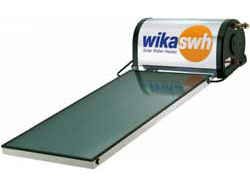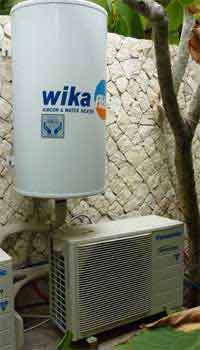Types of Water heater Compared
What Kind of Water Heater Should I Buy?
Should I buy gas, electric, solar, air conditioner and what is a storage heater and an on demand heater.
We all depend on water heaters. This is a question I am often asked, after all heating water has become one of our basic needs.
We use them day and night for just about every day of our lives. We expect them to run endlessly without problem and they can cost us a lot of money in fuel.
Let us look at the different types of water heater, how they operate and what are their advantages and disadvantages.
See also:
A Comparison Of Water Heaters

Generally speaking while electricity is very convenient it is not the best way to heat water (except using microwaves) gas on the other hand gives you an instant hot flame - very good for heating water.
Storage water heaters can run out of hot water and you have to wait for them to heat up again. Also a tank full of hot water is constantly losing heat unless it is very well insulated.
The prices of both LPG gas and electricity have increased rapidly over the last few years and are in constant turmoil (gas is now up to Rp130,000 a cylinder and electricity will go up again in early 2015) it is very difficult to compare costs of electricity versus gas. Solar energy is, however, as cheap as it has always been.
Whatever type of heater you choose the installation cost will vary considerably depending on how much modification is needed to existing piping.
Expected lifetime for most water heaters would normally be 8 to 10 years but may be a lot shorter depending on hardness of the water, quality of heater and standard of installation.
Electric storage heaters
Probably the most common type of water heaters around the world they have an internal water storage tank encased in insulation, the water is heated by a heating element controlled by a thermostat. Cost around Rp 6 million.
Advantages
- Easy, efficient and reliable, you can install and forget.
- Good for tropical climates where heat loss is not a major issue.
- Price is reasonable
Disadvantages
- Uses a lot of power so is expensive and heavily loads circuits.
- No hot water during power blackouts.
- Once you use up the hot water you must wait for the water to heat up again.
Electric Demand Water Heaters
Not very often used in Indonesia electric demand water heaters heat the water as you use it. The water passes through the heater and is heated by an electric element that wraps around the pipe.
Advantages
- You heat the water as you use it.
- You never run out of hot water.
- There is no heat loss from tanks and pipes.
Disadvantages
- Water flow is usually low because it is difficult to quickly heat water with electricity.
- Uses a lot of power so expensive and heavily loads circuits.
- No hot water during power blackouts

Gas Demand Heaters
Gas demand or 'multipoint' water heaters use a gas burner that heats the water as you use it the water circulating in a coil around a flue. Cost Rp 2 to 3 million.
Advantages
- Probably the cheapest water heaters to buy and install.
- You never run out of hot water (very good for professional spas).
- Heats the water as you use it.
Disadvantages
- You have to regularly change the gas cylinder.
- Water can be very hot and there are problems with heating low water flow rates.
- Tendency for the heating coil to block with scale from hard water.
Gas Storage Heater
Gas storage water heaters have an insulated tank that holds the water and a gas burner that heats the water usually through a flue that goes up through the centre of the heater.
Advantages
- Hot water is available during power blackouts (as long as you are not dependent on an electric pump).
- Environmentally more friendly than electricity production.
Disadvantages
- Once you use up the hot water you must wait for the water to heat up again.
- You have to regularly change the gas cylinder
- Careful positioning is needed to protect the heater from the weather
- More expensive to buy and install than an electric storage heater.
Solar Water Heaters
Solar water heaters sit on your roof and use a panel to solar energy to heat the water which is stored in a tank (usually also on the roof). In Bali they can be very efficient. Most expensive water heaters to buy at Rp 12 to Rp 60 million depending on size and brand. They work on cloudy days because they collect infra red light. Cheap glass tube types are notorious for irreparably breaking down due to design issues.
Advantages
- They give you free hot water (once installed).
- You still have hot water when there are power blackouts.
- Usually simple systems that need very little maintenance.
- Usually have an electric element backup.
Disadvantages
- It is vitally important to select a good design.
- Some are very expensive so may not manage to pay for themselves.
- They only work during the day.
Air Conditioner Water Heaters

Air conditioner water heaters work by using the heat given off by air conditioners during the refrigeration cycle to heat a tank full of water. They are simple, efficient and cost effective and collect otherwise wasted heat. Some designs have reliability issues. Cost is Rp 6 to 7 million for a standard 4 person unit.
Advantages
- They give you free hot water if you normally use an air conditioner.
- Cost to buy and install is little more than a standard electric water heater.
- Backup electric elements are available.
- Pay for themselves in about 3 years.
Disadvantages
- You have to run an air conditioner for 2 hours to heat the water.
- Some models have reliability issues.
See also:
Copyright © Phil Wilson December 2014
This article, or any part of it, cannot be copied or reproduced without permission from the copyright owner.
